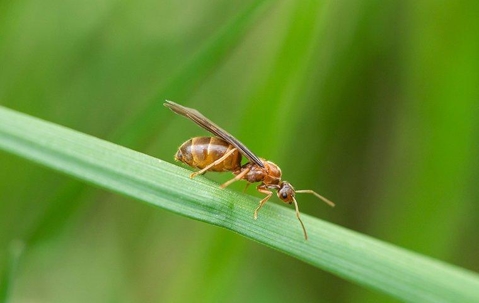Most people don’t panic or worry about ants being inside their Moline home. Since they are small and easy to crush, it’s assumed they aren’t much of a threat. Residents don’t put the effort into receiving pest control for these bugs. This is a big mistake. Ants should not be underestimated. They carry inordinate amounts of germs on their bodies, that can lead to you or your loved ones becoming sick. If that isn’t concerning enough, several species can bite or sting you and many can also damage property.
Among the subtypes in Moline are small honey ants. They too have their own brand of ruin. By taking time to read about them, you’ll find out how to prevent this pest. Last, but not least, you’ll discover how Quik-Kill Pest Eliminators can intervene on your behalf.
What Do Small Honey Ants Look Like? How Do They Behave?
Small honey ants have a name that says it all. The largest they get is ⅛ of an inch long. They have glossy brown or black bodies, with a significantly darker stomach that’s shaped like a triangle. Their colonies are also of meager size, especially in comparison to other ant groups.
Outside is where small honey ants want to be. They build nests in:
- Soil
- Flowerbeds
- Plants
- Shrubs
- Logs
- Beneath rocks
When they tunnel in dirt and soil, it makes a mound that looks like a crater. Due to their proximity in yards, they sometimes wind up indoors. They’ll enter through cracks around foundations, windows, and doors. From that point, they’ll inhabit voids in floors and walls, and forage out for sugary liquids, sweet foods, bread, fruit, and fellow insects to eat. On your lawn, they’ll focus on honeydew, sap, and bugs. Though they’re active year round, their peak activity is in the winter.
Small honey ants don’t bite or sting, but that doesn’t mean they're harmless to humans. As mentioned earlier, they harbor illness-causing bacteria. When they crawl on surfaces and in food, they can spread contamination.
How Can You Prevent Small Honey Ants?
In order to keep your home or business ant-free, you’ll have to be stringent about your cleaning practices and building maintenance. You’ll also have to take great care of your land’s exterior. This includes not just the structure, but the yard as well. It might sound tedious, but you’ll be glad you did it. Here are some specific actions you can take:
- Seal gaps you find around the roof and utility lines, foundations, screens, and windows. Ants can get through any size opening.
- Place sweeps on all exterior doors.
- Groom your yard and greenery often.
- Distance plants, shrubs, flowers and gardens from exterior doors.
- Check potted plants before bringing them inside.
- Equip both indoor and outdoor garbage canisters with tight lids.
- Clean up food messes immediately, and store food in airtight containers. This goes for pet meals too.
- Regularly vacuum, wash dishes, clean the kitchen and pantry, and take out the trash.
- Fix leaks.
How Can Quik-Kill Pest Eliminators Help With Ants?
For over 90 years, Quik-Kill Pest Eliminators has protected homes and businesses from critters, like ants. We’ve set an industry standard by utilizing advanced technology and having expert staff. Our team consists of entomologists and QualityPro certified technicians. Your ant troubles will melt away once our potent, but safe, products are applied.
We offer an array of inexpensive services, designed to cover a range of insect and creature treatments. You can schedule a free inspection and/or receive an estimate with no obligation today! We’re all about flexibility and accommodating our customers to the best of our ability. Give us a ring!

